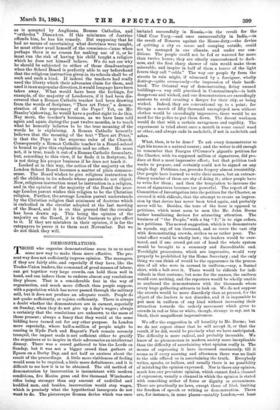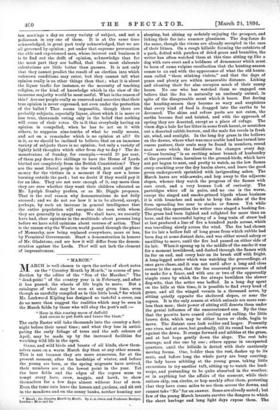DEMONSTRATIONS. T HOSE who organise demonstrations seem to us to need
some new way to make them more effective. The pre- sent way does not sufficiently impress opinion. The managers, if they are fairly able, and especially if they have, like the Trades-Union leaders, the command of great masses of labour, can get together very large crowds, can hold them well in hand, and can induce them to endorse almost any resolutions they please. That is a considerable feat in the way of organisation, and much more difficult than people suppose, with a population which has never passed through the military mill, but it does not produce an adequate result. People do not quake sufficiently, or rejoice sufficiently. There is always a doubt whether the demonstrators are in earnest, especially on Sunday, when they do not give up a day's wages ; always a certainty that the resolutions are unknown to the mass of those present; always a fancy that they would at the same bidding have turned out for any other purpose. In London more especially, where half-a-million of people might be roaring in Hyde Park and Regent's Park remain serenely tranquil, the impact made is not sufficient either to gratify the organisers or to inspire in their adversaries an intellectual dismay. There was a crowd gathered to hiss the Lords on Sunday, but it was not a bigger crowd than gathers at Epsom on a Derby Day, and not half so anxious about the result of the proceedings. A little more visibleness of feeling would seem to be required, a little more definiteness, and it is difficult to see how it is to be obtained. The old method of demonstration by insurrection is inconsistent with modern conditions, five Maxim guns and five thousand Winchester rifles being stronger than any amount of undrilled and huddled men, and besides, insurrection would stop wages, which is precisely what the hypothetical insurgents do not want to do. The picturesque Roman device which was once imitated successfully in Russia,—in the revolt for the blind Czar Yury,—and once unsuccessfully in India,-en the revolt of Benares against the House-duty,—the device of quitting a city en masse and camping outside, could not be managed in our climate, and under our con- ditions. The people could not be fed or watered for more than twelve hours; they are utterly unaccustomed to dark- ness, and the first sharp shower of rain would make them miserable, and inspire in half of them a terror of the light fevers they call " colds." The way our people fly from the streets in rain might, if witnessed by a foreigner, wholly destroy—quite erroneously—the impression of their hardi- hood. The Oriental way of demonstrating, firing unused buildings—a way still practised in Constantinople—is both dangerous and wicked, and our demonstrators are exceedingly anxious to avoid creating a danger for their city, or being wicked. Indeed, they are conventional up to a point; for though a march of fifty thousand unemployed men without clothes would be exceedingly impressive, there would be no need for the police to put them down. The decent workmen would do that with a certain savageness and rapidity. The experiment is tried about once a month in some casual ward or other, and always ends in sackcloth, if not in sackcloth and ashes.
What, then, is to be done ? To ask every demonstrator to sign his name is a natural course; and the writer is old enough to remember that Feargus O'Connor's gigantic petition for the Charter, with its supposed million of signatures, did pro- duce at first a most impressive effect; but that petition took weeks to prepare, and certainly could not be signed on any single day. Petitions, too, provoke forgery almost irresistibly. Our people have learned to write their names, but an extraor- dinary number of them are shy of doing it ; other people have to write for them ; and then the temptation to increase the mass of signatures becomes too powerful. The report of the , Committee of Investigation into the petition for the Charter, so covered it with ridicule, that the attempt to create an impres- sion by that device has never been tried again, and probably never will be. Besides, the tone of the hour is opposed to petitions, which must seem to men like Mr. John Burns rather humiliating devices for attracting attention. The
business of " the People," with a big " is to sign orders, not petitions. The newest suggestion, which is to demonstrate in squads, say, of ten thousand, and so cover the vast city with demonstrating crowds, strikes us as rather poor. The total effect would be wholly lost; the leaders would be over- taxed, and if one crowd got out of hand the whole system would be brought to a summary and discreditable end. Torchlight processions, which are impressive, would very properly be prohibited by the Home Secretary ; and the only thing we can think of would be the appearance in the proces- sion of all who were in earnest in uniform,—say, a flannel shirt, with a belt over it. There would be ridicule for indi- viduals in that costume, but none for the masses, the uniform would cost nothing, and the reporters would be wholly unable to confound the demonstrators with the thousands whom every huge gathering attracts to look on. We do not suppose the crowds would be more disorderly than at present, for the object of the leaders is not disorder, and it is impossible to put men in uniform of any kind without increasing their attraction towards the orderly movement which gives to crowds in red or blue or white, though, strange to say, not in black, their magnificent impressiveness.
We offer the suggestion in all humility to Mr. Burns ; but we do not expect either that he will accept it, or that the result, if he did, would be precisely what we have anticipated. The difficulty is more radical, and probably incurable. We know of no phenomenon in modern society more inexplicable than the difficulty of ascertaining what opinion really is. The means of expressing it have increased enormously, till it seems as if every morning and afternoon there was no limit to the aids offered us in ascertaining the truth. Everybody writes, speaks, or halloos, and usually there is no possibility of mistaking the opinion expressed. Nor is there any opinion, much less any prevalent opinion, which cannot find a channel of expression, usually a channel in which the opinion is stated with something either of force or dignity or screaminess. There are practically no laws, except those of libel, limiting the freedom of speech or writing or demonstration. There are, for instance, in some places—notably London,—at least
ten meetings a day on every variety of subject, and not a policeman in any one of them. It is at the same time acknowledged, in great part truly acknowledged, that we are all governed by opinion ; yet under that supreme provocation the able and experienced men, whose interest and business it is to find out the drift of opinion, acknowledge that for the most part they are baffled, that their most elaborate calculations are little better than guesses. It is not only that they cannot predict the result of an election into which unknown conditions may enter, but they cannot tell what opinion really is on other things than that ; what it is about the liquor traffic for instance, or the necessity of teaching religion, or the kind of knowledge which in the view of the immense majority would be most useful. What is the reason of this ? Are our people really so reserved and secretive that their true opinion is never expressed, not even under the protection of the ballot ? That seems impossible, though there are probably subjects, especially liquor, about which it is more or less true, thousands voting only in the belief that nothing will come of their votes. Or is it that everybody having an opinion is compelled, when he has to act on it with others, to suppress nine-tenths of what he really means, and act on a remainder which is no opinion at all? Or is it, as we should be inclined to believe, that on an immense variety of subjects there is no opinion; bat only a variety of lightly held thoughts which alter from day to day? The de- monstrators of Sunday, for example,—would 20 per cent. of them pay down five shillings to have the House of Lords blotted out completely from the British Constitution? They are the most liberal people in the world, you could get the money for the victims in a moment if they saw a house burning outside the park ; but we doubt if they would pay it for an idea. They are not sure enough of it, any more than they are sure whether they want their children educated as Mr. Lyulph Stanley prefers, or as Mr. Diggle proposes. That is the real reason why demonstrations do not fully succeed; and we do not see how it is to be altered, except, perhaps, by such an increase in general intelligence that the entire population will recognise the men with whom they are generally in sympathy. We shall have, we recently have had, clear opinions in the multitude about persons long before we have solid opinions about courses of action. That is the reason wby the Western world passed through the phase of Monarchy, now being replaced everywhere, more or less, by Premieral Government. Start a demonstration in honour of Mr. Gladstone, and see how it will differ from the demon- stration against the Lords. That will not lack the element of impressiveness.



































 Previous page
Previous page